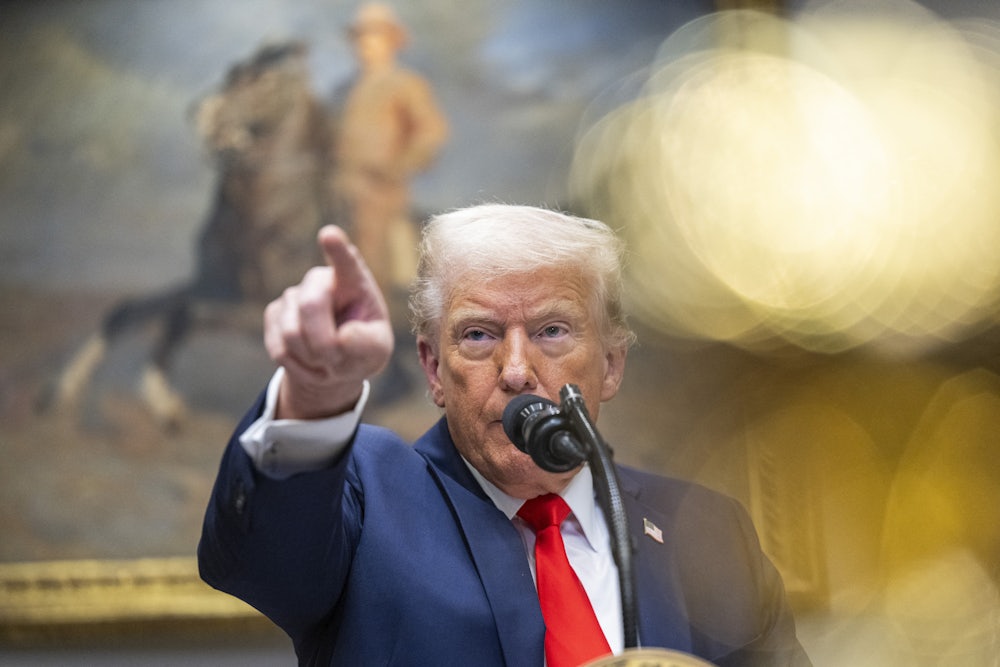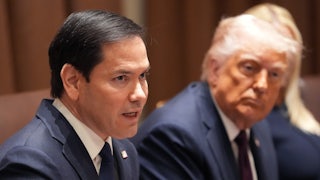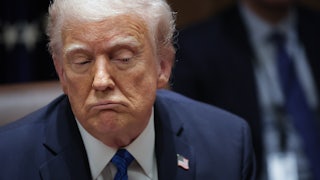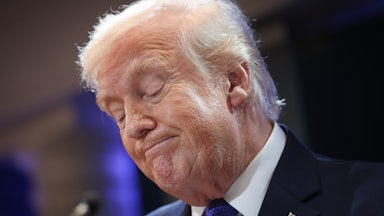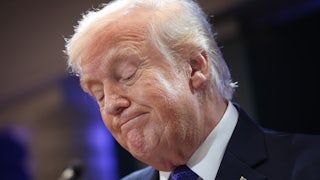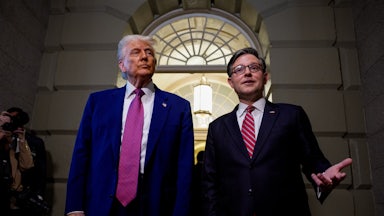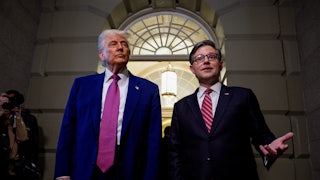Trump’s obsession with Canadian annexation has quickly gone from an awkward joke to a serious security concern. With more tariffs due April 2, Canadian leader Mark Carney has said Canadians should “prepare for the worst.” Trump’s threats should not be dismissed, at this point, as crude bargaining tactics or buffoonish theatrics. They’re also a sign of something more: the rise of a post-liberal global order defined not by institutions or alliances but by loyalty and hierarchy.
We’ve been here before. In the spring of 1941, as Hitler’s armies swept across Europe, American conservative James Burnham published a book outlining his vision for a new global order: a post-democratic world centered around a few powerful blocs he called “super-states.” These great powers would exercise complete dominion over their designated regions while locked in perpetual rivalry with each other. The United States, Burnham thought, should “draw a ring” around the Western hemisphere, securing the Panama Canal and reducing Canada to “a satellite.” This new order would be governed not by international law but by personal dealings among the great powers, who would control the sovereignty of weaker states and suspend it as they wished.
George Orwell used Burnham’s bleak vision as the geopolitical setting for 1984, in which three giant autocratic empires live in a state of permanent conflict. And now, the real-world global order is starting to take on a disturbingly similar shape.
Once we make sense of his preferences for the post-liberal order, Trump’s treatment of Canada—but also of Russia, Greenland, and others—begins to make a lot more sense. Trump’s approach to the international system is a strange blend of neo-feudal hierarchy with transactional politics guided by five principles: dominance of great powers, conditionality of alliances, weaponization of trade, irrelevance of institutions, and personalization of diplomacy.
Trump has not read Burnham, of course. Even to call his vision of the international system an “order” may be lending it a false coherence, given how many of his dealings are temper-driven and improvised. Yet Trump’s fundamental views on the international system, expressed both in his statements and his policies, have been remarkably stable over the years. Together, these five core rules—not philosophical commitments so much as operational principles—completely upend the liberal internationalism that has structured U.S. foreign policy since 1945.
Rule #1. Great Powers Run the World
Trump’s actions consistently reflect a great-power-centric view of global order, in which major states dictate terms while smaller states fall in line, their sovereignty conditional and tenuous. To preserve peace, powerful states need zones of influence. Thus, Russia might have legitimate claims over Ukraine, in the same way the United States might have claims in its own backyard.
It’s not an outright defense of conquest, exactly. More like an acknowledgment of gravity: Russia is big. Ukraine is small. To pretend otherwise is foolish. Trump’s instincts resemble an older, pre-twentieth-century tradition of geopolitics. He’s not interested in defending the sovereignty of small nations, especially if it doesn’t offer an obvious payoff.
This is not a rules-based order but a global concert-of-powers system like the one established in the wake of the Napoleonic Wars, to govern Europe for the first half of the nineteenth century. One underlying assumption is that great powers, though they may squabble, share interests in common. (Unlike Burnham, Trump doesn’t see the super-states as doomed to fight.) Order is preserved not through law but through tacit understandings between dominant leaders. There is always a deal to be made, a profitable arrangement to be reached. It’s a peace pact between competing mafia families who jealously guard their own turf.
This worldview underpins his approach to Russia and Ukraine, where Trump is clearly willing to accommodate Russia’s bid for regional dominance. He has dismissed Ukraine’s NATO aspirations as a provocation and has repeatedly hinted that Russia’s control over Crimea is legitimate. His administration now openly states that Ukraine and others must consider Russian interests in the region.
Rule #2. Alliances Are Protection Rackets
Since great powers run the show, their allies are, at best, useful sidekicks, and at worst free-loaders who refuse to recognize their vassal-like status. It’s a billionaire’s idea of allies—hired help, not strategic partners. There is no trust or shared purpose but, rather, temporary arrangements, maintained at the pleasure of the powerful. If an ally fails to pay or align with Trump’s priorities, the U.S. walks away.
Hence Trump repeatedly demanding that NATO countries “pay their fair share.” Even in the recently leaked group chat about U.S. war plans against the Houthis, Vice President JD Vance’s main concern was that Europe would pay the U.S. back for its services. All of these suggest Trump sees alliances as protection rackets: U.S. power is to be leveraged for direct financial or political gain.
Rule #3. Global Trade Is a Weapon
Perhaps the most visible way in which Trump separates himself not only from the current liberal order but also from many fellow conservatives is his view of trade as a zero-sum game. Global interdependence, once seen as a tool of peace, is now weaponized via sanctions, tariffs, and tech bans. His chaotic imposition of tariffs on steel, autos, and more is not about deficits or fairness but subordination. Economic tools are used to enforce political compliance.
This reflects a deeper belief: that trade is a weapon of the state, not a by-product of the market. Interdependence is not a source of peace but a vulnerability to be exploited. Breaking with his party’s free-market ideologues, Trump sees concerns about economic efficiency and mutual benefit as secondary, if they matter at all.
Rule #4. International Institutions Don’t Matter
The Trump administration sees institutions like the U.N., World Health Organization, and World Trade Organization not as tools of influence or pillars of a stable world but as institutions rigged against the U.S., and obstacles to American sovereignty. In his first term, he withdrew from (among others) the Paris climate accord, the Iran nuclear deal, and the Trans-Pacific Partnership. In his first few weeks back in office he has withdrawn from bodies like the WHO and Unesco. Democracy promotion via international institutions, once a central if controversial plank of U.S. global engagement, has been discarded completely, with the shuttering of USAID perhaps the most dramatic example.
It isn’t just that he dislikes these organizations, it’s that he doesn’t believe in their premise for existence. Trump favors a world of bilateral deals, not global rules. And that brings us to …
Rule #5. Diplomacy is Personal Negotiation
In Trump’s world, states don’t negotiate—people do. Specifically, powerful men. Diplomacy occurs not through envoys or back channels but through direct, theatrical encounters with leaders ranging from Zelenskiy to Kim Jong-un, built on personal rapport. You could say it’s international diplomacy as reality TV, complete with public tests of loyalty. But it also reflects a core belief that international politics is not structured by law or history but by the will of dominant men. The international system isn’t a community of states but a negotiating table where strength and personal charisma rule.
So what kind of order is this? It’s clearly not the liberal international order, but it’s not realist, either. Classical realism, as articulated by thinkers like Hans Morgenthau and Henry Kissinger, centers on the careful management of state power, the preservation of stability, and the rational pursuit of national interest. Trump’s approach is erratic and personalized, replacing “national interest” with patronage and personal rule. It’s almost pre-modern, rejecting even seventeenth-century Westphalian sovereignty as a pretense while elevating vassal-like tribute and gratitude, kleptocracy and brute power—a kind of primordial politics that prizes dominance over cooperation, loyalty over legitimacy, and short-term gain over systemic stability.
This isn’t just about rejecting liberal internationalism, though. In breaking with the globalists, Trump is rejecting modern capitalism itself. Gone is the neoliberal belief in global markets as arenas of cooperation governed by rules. His vision of economic life treats trade not as a source of mutual growth but as a weapon of dominance, where tariffs punish the weak, supply chains are repatriated by force, and multinational firms are bent to the will of the state. Long-term trading partners like Canada can therefore be tossed aside, since this vision is openly contemptuous of interdependence.
Of course, realists have long questioned the utility of multilateral institutions, and NATO burden-sharing has been a point of contention for decades. What sets Trump apart is not the originality of any single position but the way he fuses these elements into a confrontational vision that challenges the foundational norms of the postwar American order, at a moment when that order appears weakest. His disdain for allies, open transactionalism, use of trade as a bludgeon, the rejection of legalism, and personalization of diplomacy are brought together with an intensity, explicitness, and indifference to constraint that amounts to a rupture.
Canada’s place in such a system is clear: It is not a partner but a dependent that must align itself politically, economically, and militarily with Washington’s interests. Trump’s Canada obsession is no more random than his Greenland obsession, however outlandish both may sound. Trump, knowingly or not, articulates a vision of a multipolar tributary system—a geopolitical structure rejecting liberal internationalism and classic realism, and one with admirers in the capitals of both Russia and China.
For all its faults, the liberal order established in 1945 and solidified in 1991 offered a measure of predictability to many less powerful states. That predictability is now quickly disappearing in favor of a system with a more brutal logic. Those who lamented the liberal order’s shortcomings may soon discover, to paraphrase Winston Churchill, that it really was the worst kind of order except for all the others.
